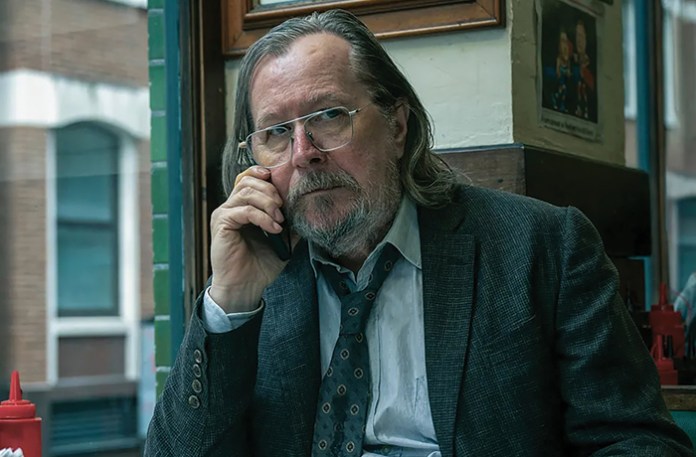Slow Horses’ fifth season, now streaming, is another reminder of why the show has become one of AppleTV’s biggest audience hits. Based on a book series by Mick Herron, the show is pacy, funny, and boasts a murderer’s row of acting talent that includes Gary Oldman, Kristin Scott Thomas, Jonathan Pryce, and Hugo Weaving. It also walks a becoming line between topical and escapist: plot conceits are vaguely ripped from the headlines and stakes feel weighty, particularly since the show is willing to kill sympathetic characters, yet the show is set in a world that is lightly fictionalized enough to feel almost cozy.
For those unfamiliar, the eponymous Slow Horses are a fictional branch of MI5, Britain’s domestic intelligence agency, based in a dilapidated London building called Slough House. (A sneering nickname — it is so far from headquarters it “might as well be in Slough.”) These agents are MI5’s castoffs, people banished from headquarters because of their incompetence, their personality problems, or because they crossed the wrong bigfoot. They’re kept around to undertake the missions that people in headquarters can’t be bothered to do — or, because of political sensitivities, don’t want to.
Unlike many TV shows, Slow Horses succeeds wildly at both frenetic plotting and vivid characterization. The latest season opens with a typical example: After a careening series of events that sees one member of the titular shabby and incompetent espionage team narrowly survive a hit, the team gathers to plot its next move. The team’s shambolic but shrewd leader, Jackson Lamb (Oldman), picks a fancy penthouse restaurant for the meeting, on the grounds that no one would ever expect to find them there — a thesis immediately underscored when their socially inept tech wizard, Roddy Ho (breakout supporting star Christopher Chung), insists on bribing a waiter for a good table (the restaurant is empty), and then ordering a “pint of Red Bull.”
The show’s previous season was polarizing and felt, to this viewer, like a very slight step down, in part because the plot took one Slow Horse abroad, away from the others, reducing the interpersonal tension that is the show’s essential energy. The new season plays it safer, for better or worse, and all the action stays close to home. Thanks to some gorgeous night-time cinematography (and, one presumes, Apple’s country-sized production budgets), the mundane but glittering streets, rooftops, and alleys of 21st-century London feel surprisingly cinematic.

The new season involves an act of mass violence in London that is shocking even in a show that is fairly willing to depict brutality. That violence has a possible bearing on a political race between a Nigel Farage-esque right-wing populist (Christopher Villiers) and a hopey-changey left-winger in the mold of Sadiq Khan (Ted Lasso’s Nick Mohammed). The show has considerable fun skewering both: The right-winger’s wife (Victoria Hamilton) is a vicious newspaper columnist who apologizes for being late to a meeting because she was held up arguing with her editor about whether the term “octaroon” is racist, and the left-winger is a platitudinous moralizer whose slogan is “Make London Londerful Again.”
The Slow Horses are soon drawn into a messy investigation into the mass attack, but their efforts are, as usual, hindered by the teammates’ idiosyncrasies and inability to work together with the barest vestige of professionalism. River Cartwright (Jack Lowden), an ambitious and capable agent whose overeagerness nevertheless often leads to catastrophes, has grown slightly more jaded, but still wants to save the day and prove himself superior to the other Slow Horses. Shirley Dander (Aimee-Ffion Edwards), paranoid and recovering from substance problems and possible PTSD, grasps a crucial clue but, as usual, no one believes her. Their mysterious, hoodie-wearing colleague Coe (Tom Brooke) is too weird even for Slough House, and the idealistic, diligent Catherine Standish (Saskia Reeves) is treated like a doormat.
Meanwhile, agent Louisa Guy (Rosalind Eleazar), is leaving the team, perhaps for good; the incel-ish Ho has found true love with a woman who seems like she may have an ulterior motive; and Lamb, between bouts of rudeness and weaponized flatulence, has achieved something like a detente with his steely senior colleague at MI5 headquarters, Diana “Princess Di” Taverner (Scott Thomas).
The machinations of the six-episode season are too complicated to summarize but encompass, among other things, an attempted political assassination, an Extinction Rebellion-style environmental group, various shootouts and chases, arms dealers, scheming lobbyists, and Britain’s foreign policy decisions coming back to haunt it. Slow Horses remains an exceptionally tightly written show, and viewers will no doubt be left eager for the sixth season, which is already in production.
THE TENTACLES OF THE SQUID GAME’S SUCCESS
If there is one problem with an otherwise strong season of an excellent show, it may be that the show’s characterizations are so vivid that they have begun to cut against character growth. On the one hand, this is, in a counterintuitive way, oddly realistic — characters in film and TV are given to “change” and “growth” in ways that the average human generally isn’t — but on the other, Slow Horses can sometimes feel stuck in a sitcom-y mode, with the team rarely learning from either their dysfunctions or victories. Surely even someone as stubborn, yet smart, as River Cartwright will eventually achieve some self-awareness? Surely even MI5 headquarters will eventually recognize the Slow Horses’ peculiar talent for rescuing victory from the jaws of defeat (though usually after first accidentally widening the jaws)?
In any event, the show remains a delight — thrilling, darkly funny, and endearing. And few other characters are as indelible as Oldman’s Jackson Lamb. In one scene, he rummages through a car, finds a mostly empty can of Pringles, and pours the dust directly into his mouth. Reader, I was captivated.
J. Oliver Conroy’s writing has been published in the Guardian, New York magazine, the Spectator, the New Criterion, and other publications.
